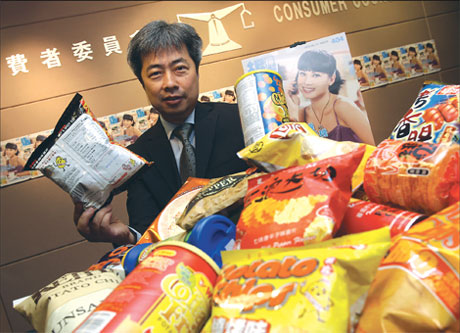Council wants junk-food labels revised
Updated: 2010-06-16 06:55
By Timothy Chui(HK Edition)
|
|||||||
|
Philip Leung, spokeman for the Consumer Council, display snacks of various brands at a press conference in Hong Kong Tuesday. He called on football fans to eat healthier snacks during the World Cup as the watchdog found that more than 90 percent of 32 chips or crisp samples contained excessive fat. Edmond Tang / China Daily |
The Consumer Council wants food manufacturers to revise nutritional information on prepackaged snacks to give consumers a true conception of what they're putting in their mouths.
The council wants the information listed on a "per 100 grams" basis. Council chairwoman Connie Lau said tables based on servings sizes of less than 100 grams may be misleading, hiding the true extent of fats, sugars and salts in junk foods.
"If manufacturers are providing nutritional values at 40 grams or 50 grams, it is not reflecting the whole situation," she said.
For example, if 100 grams of a snack contains 1 gram of trans fats, a nutritional label based on serving sizes of 25 grams would mean the amount of trans fats could be claimed as zero, she said.
"There will be the danger that consumers will believe nutritional claims of smaller serving sizes," she added.
The city's food labeling law comes into full effect July 1 after a two-year grace period.
It will require prepackaged foods to include information on energy, protein, carbohydrates, total fat, saturated fat, trans fat, sodium and sugars.
It will also require data to back any nutritional claims.
Lau's appeal follows a plea from the Council for healthy snacking during the 2010 World Cup, when thousands of local fans are expected to stuff themselves with favorite comfort foods.
In a Council study of the nutritional values of 32 popular chip snacks, it was found that 80 percent of samples contained 500 kilocalories per 100 grams or the equivalent of a quarter of the body's suggested daily energy intake.
Roughly 90 percent of the samples had high fat levels, based on World Health Organization standards. That means an amount in excess of the WHO's suggested 20 grams of total fat per 100 grams.
The worst offender, Super Oooh Cheese Flavored Snacks, had 41.6 grams of total fat with 17.1 grams of that being saturated fats, per 100 grams.
"Consumption of a whole pack, which is 60 grams amounts to 40 percent of a person's WHO daily intake limit," Council spokesman Philip Leung said.
Aside from high fat content, consumers were also warned to watch out for excessively salty foods. The study's least fatty snack, Four Seas Crispy Prawn Cracker had only 1.2 grams of total fat, but it was the saltiest of the samples with 1,800 milligrams of sodium per 100 grams.
The council's latest report also included a study which found basic maternity fees in private hospitals had jumped by more than 10 percent and as high as 50 percent since 2002.
The study found some four-day packages costing more than HK$100,000, while caesarean packages exceeded HK$200,000 for a five-day package.
The prices depended on the size of private hospital suites and the range and grade of facilities and services provided, Leung said.
"The increases, in many cases, reflect an upgrade in both facilities and scope of services. The market has seen a new supply of luxury maternity packages to cater to the needs of the well-to-do," he added.
Leung warned prospective clients to go over fee structures carefully, since the packages did not cover anesthetics, which could range from HK$2,200 to HK$10,000.
The packages also did not cover special treatment or lab tests.
Basic maternity fees at public hospitals for local residents can cost a few hundred dollars while non-residents have to pay a minimum of $39,000.
The report also issued a warning on hydraulic beds after the death of a domestic helper who was found trapped inside a hydraulic bed in Tsuen Wan in May of last year.
The Council recommends people buy beds that include self-locking gas springs and called for regular checks to ensure the beds are in working order.
The council also suggests the beds should not be operated by anyone who is alone, and not by the elderly or children.
China Daily
(HK Edition 06/16/2010 page1)
